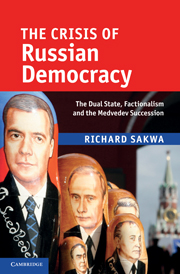Book contents
- Frontmatter
- Contents
- List of tables
- Preface
- Acknowledgements
- Note on transliteration
- 1 The dual state in Russia
- 2 Succession struggles and electoral contests
- 3 Political power and factionalism
- 4 A genuinely political economy
- 5 Managed succession
- 6 War of the Putin succession
- 7 Duma selection
- 8 Presidential succession
- 9 Medvedev's challenge
- 10 Conclusion: transcending the dual state
- Bibliography
- Index
10 - Conclusion: transcending the dual state
Published online by Cambridge University Press: 05 June 2012
- Frontmatter
- Contents
- List of tables
- Preface
- Acknowledgements
- Note on transliteration
- 1 The dual state in Russia
- 2 Succession struggles and electoral contests
- 3 Political power and factionalism
- 4 A genuinely political economy
- 5 Managed succession
- 6 War of the Putin succession
- 7 Duma selection
- 8 Presidential succession
- 9 Medvedev's challenge
- 10 Conclusion: transcending the dual state
- Bibliography
- Index
Summary
The succession operation was brought to a successful conclusion. The parliamentary elections ensured the predominance of United Russia, accompanied by a limited choice of other parties. In the presidential contest, scenarios that had envisaged a third term for Putin or an orange revolution gave way instead to one in which a single nominated successor won an overwhelming mandate, while Putin retained considerable power as prime minister. Putin gained a third term by default, without infringing the letter of the constitution. Presidential succession both opened up the possibility of democratic renewal while limiting the political options. In his keynote speech to the World Policy Conference in Evian, France, on 8 October 2008, Medvedev noted that ‘Any crisis offers at the same time a chance to resolve systemic contradictions.’ Opportunities, however, are not always taken. The formal constitutional election had been accompanied by a para-political struggle between elite factions. Putin had achieved his fundamental goal – leadership, and elite and policy continuity.
No sooner was the tandem in place than it was challenged by economic and foreign policy crises. The stability of the system was now tested, but the fundamental challenge was to reduce the arbitrariness of the administrative regime while enhancing the hegemony of the normative state. Genuine constitutionalism, accompanied by free elections and an independent judiciary, would constrain the shadow state and allow the autonomous operation of political institutions and social forces. Institutional rules would gain a life of their own and undermine the ‘manual’ operation by the regime.
- Type
- Chapter
- Information
- The Crisis of Russian DemocracyThe Dual State, Factionalism and the Medvedev Succession, pp. 353 - 365Publisher: Cambridge University PressPrint publication year: 2010



